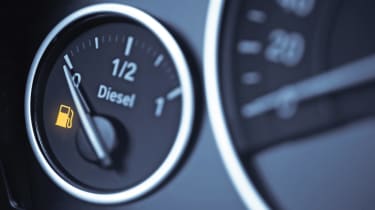Crazy driving laws from around the world
At the time of year when many of us will be driving abroad, we take a look at some of the world's oddest rules of the road
Like in every country, drivers in the UK must follow some basic rules of the road – in this case, the Road Traffic Act, with guidance provided by the Highway Code. And while many find certain rules a little frustrating, the vast majority are based on simple common sense.
You'd expect the same to be the case for drivers in other countries and, for the most part, it is. However, there are times where local traffic situations require specific rules that appear rather odd or unusual to non-natives. There are even situations where the wording of a rule makes it seem a more than a little mad.We've done some globetrotting to find the most peculiar, weird and downright baffling traffic rules from countries around the world.
Fines for dirty cars in Russia
Russia covers so many thousands of square miles that its weather and road conditions are extremely varied and in many parts cars can get dirty very quickly indeed. Woe betide you if you let your car's cleanliness slip, though – drivers of dirty cars can be pulled over and fined. It's up to the discretion of the individual police officer as to when a car is ‘too dirty’, but mucky number plates are a definite no.
Allow 50m between cars and pedestrians in Singapore
Singapore is a vibrant, modern city and its layout is designed to separate road traffic from pedestrians as much as possible. Its strict planning is intended to increase safety, and one quirk in its road legislation is that it's illegal for a car to come within 50m of a pedestrian, with a potential fine if that rule is broken.
Slow down for wildlife in South Africa
South Africa is known for its wild, sweeping plains, and motorists can feel a little isolated on its long, exposed highways. It pays for drivers to stay alert, too – wildlife roams free and enjoys the same right to occupy the road as motorised traffic does. If you're caught ignoring this rule, and fail to slow or stop for animals on the road, you could face a hefty fine.
Spare driving glasses mandatory in Spain
Here's a rule that seems pretty sensible, and which might not have occurred to many of us. We all understand the need for good eyesight while driving – in the UK you must be able to read a clean number plate from 20.5 metres. In Spain, though, anybody who needs glasses in order to drive must always carry a spare pair in their vehicle.
No naked driving in Thailand
In what many may see as a victory for taste and decency, Thai road laws prohibit anybody naked from the waist up from travelling on the highway. Local criminal code states that "any person who performs a disgraceful act in public by undressing himself, exhibiting his undressed person or committing any other act of obscenity, shall be liable to a fine". It's up to the individual police officer to use discretion when deciding when a serious offence has been committed, though.
Drinking and driving OK in Costa Rica, just don’t be drunk.
Sometimes it's all about how a law is worded, and Costa Rican law is probably quite similar to that of any country where there's no rule about consuming food and drink behind the wheel. In Costa Rica, there's no law to prevent you from drinking alcohol while driving. However, its rules on driver intoxication are just as strict as any other country. So while it's technically not illegal to drink and drive in Costa Rica, being a drunk driver is as offensive as anywhere else on the globe.
Don’t run out of fuel on the Autobahn in Germany
It's widely known that Germany is one of the few places on earth where you can legally take your car to its limit on the public highway, although remaining stretches of unrestricted Autobahn are disappearing fast. Be aware, though, that stopping unnecessarily on the Autobahn is strictly against German traffic law, and that includes running out of fuel. Having insufficient fuel to complete a journey safely is seen as driver negligence.
Keep both hands on the wheel in Cyprus
Another sensible rule that's often misinterpreted is Cyprus's strict stance against mobile-phone use when at the wheel. The law is often misquoted to suggest that it's illegal to make offensive hand gestures at other road users, and this stems from the rule that drivers should keep both hands on the wheel at all times. Hands-free phones, though, remain fine to use behind the wheel.
Don’t sound your horn at the sandwich shop in Arkansas, US
Sometimes historic laws can remain in statute long after amendments are made, and Arkansas law still prohibits "any person operating a vehicle and sounding its horn or bell, at any place where cold drinks and/or sandwiches are served" after 9pm. That anachronistic law, though, is actually little different from UK traffic rules, that state you shouldn't use your horn on a restricted road (street-lit, 30mph speed limit) between 11:30pm and 7:00am.
Bicycle acrobatics banned in Galesburg, US
Sticking with the USA, a local statute in Galesburg, Illinois concerning urban cyclists amuses with its turn of phrase. It states: "No rider of a bicycle shall remove both hands from the handlebars, or feet from the pedals, or practice any acrobatic or fancy riding on any street." It seems that showboating cyclists will need to practice their art somewhere else.
| Heading abroad this summer? You may find these features useful: |
| What you need to know about driving abroad |
| Our tips on hiring a car abroad |
| Packing your car for the holidays – made easy |
| Top tips for driving in France |
| Top tops for driving in Spain |
Most Popular

Suzuki’s new 10-year warranty is free – here’s how to get it
Tips & advice

Car dashboard warning lights: what does each symbol mean?

Electric car charging stations: public networks, charger types, apps and maps











